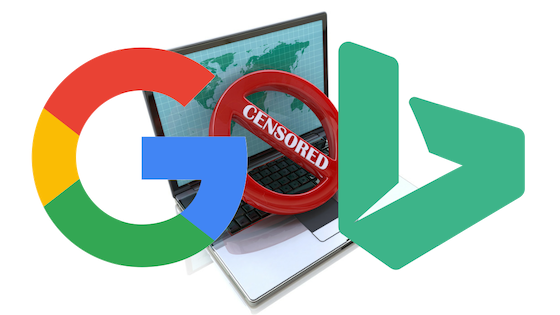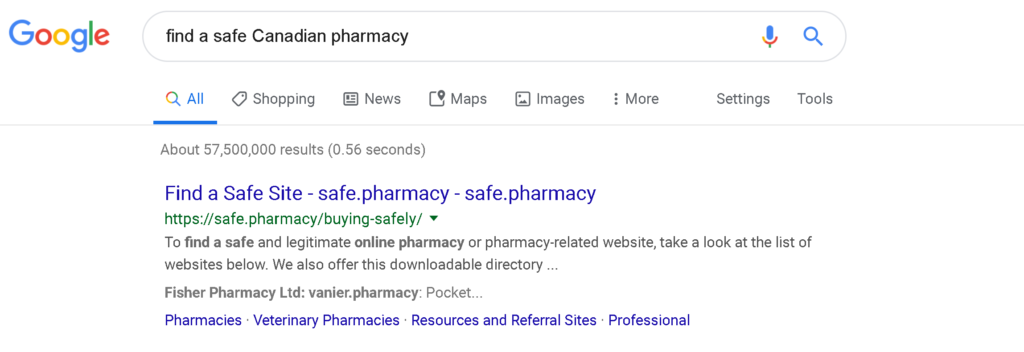Until we lower drug prices here at home in America, online access to affordable medication internationally is clearly essential. But what if we lived in a country where people were no longer able to find safe international options online?
In an ideal world, search algorithms empower consumers to find the exact information they are looking for on these search engines. In a recent Google algorithm update (March 2019), which affected the “natural” or “organic,” non-paid search results, we wonder if there was foul play involved in which Google was caving in to Big Pharma. The Electronic Frontier Foundation identified this problem in 2016, in “How Big Pharma’s Shadow Regulation Censors the Internet.”
The results at the very top of your Google search are often ads, which are of course paid placement: a different problem.
Please check out our new video on this difficult and troubling topic of censorship of online pharmacy and drug prices content.
Those patients searching on Google for information about affording medicine through online pharmacies were significantly disadvantaged by the Google March 2019 Core Update. The reason is that results for PharmacyChecker ‘s verification and pricing information are now much harder to find than they were on March 11th, 2019— a day before the update.
Since 2003, PharmacyChecker has provided online pharmacy verification and drug price comparison information to help people afford medicines. We are proud that the information we provide has helped millions of patients find more affordable prescription drugs, safely, from other countries through importation. High drug prices are a crisis in the United States, and combating that very crisis has become my life’s mission, extending way beyond “online pharmacy.” I’m also the founder of Prescription Justice, a non-profit organization advocating for policies and laws to lower drug prices in America.
With Google’s recent update, information that PharmacyChecker provided on safely importing medication from online pharmacies moved from being in the top of search results to virtually out-of-sight. Searches for “reputable overseas online pharmacies” or “online pharmacies” used to lead directly to results for PharmacyChecker, but that’s no longer the case. Instead, the first page results for a term such as “online pharmacies” are now just a barrage of overzealous warnings from the FDA (2 results), the National Association of Boards of Pharmacy (2 results), Poison Control, and the DEA.
There is certainly a need for warning consumers about the dangers of rogue online pharmacies, which happens to be a big part of PharmacyChecker’s mission. But when people are looking for affordable medicine online from Canada or other countries, they are not interested in the dangers of rogue online pharmacies. They need the safest international pharmacy options. Since March 12th, Google has made it very hard for people who need good information on these topics to find it. Such consumers will too often be left scared by incomplete information and, as a result, may forgo medicine they need, even though these medicines can be safely and affordably accessed.
For many people, safe international online pharmacies have been a lifeline of affordable medicine. High drug prices are responsible for tens of millions going without medication each year in our country, and, sadly, this has been going on for decades.
What if popular search engines, such as Google and Bing, censored access to safe online pharmacy options?
Unfortunately, large pharmaceutical companies would like to see and are lobbying for such censorship. At a hearing before the U.S. House Energy and Commerce Committee, Subcommittee on Oversight and Investigations, on February 27, 2014, a representative of Eli Lilly, a multinational pharmaceutical company, recommended removing all online pharmacies, if they sell medicines from pharmacies outside the U.S., from Google’s search engine in the U.S.:
“The online pharmacy would still be available on the Internet, no doubt hosted in another country, but it would not be found by the patient in the U.S. who is doing an Internet search for his or her medication.”
PharmacyChecker is viewed by the pharmaceutical industry as a threat to its censorship goals, and I have testified before Congress on this issue. PharmacyChecker doesn’t sell medicines or process prescription orders in any way, domestic or international, but we do have the best information on finding safe international online pharmacies and their prices. That makes us a target of the drug companies.
PhRMA Targeted PharmacyChecker with Ads on Google in 2017
For example, the lobbying group best known for representing the interests of multinational drug companies, the Pharmaceutical Researchers and Manufacturers of America – (PhRMA) or Big Pharma – was placing ads on Google using our company name: “PharmacyChecker.”
When searching for “pharmacychecker,” the first organic result shows: “PharmacyChecker: Save up to 90% by comparing online prescription drug prices at PharmacyChecker. We check safety credentials…”
But above us, a Google user would see PhRMA’s ad: “Protect Patients & The Public – Oppose Drug Importation.”
I believe they have since removed those ads.
That’s just a taste of PhRMA’s reach. The pharmaceutical industry is behind the leadership and funding of many “patient-centered” organizations, sometimes with government cooperation, all to make people believe it’s inherently dangerous to buy lower cost medicine online from another country. Such organizations include (but are not limited to) Alliance for Safe Online Pharmacies, Partnership for Safe Medicines, Center for Safe Internet Pharmacies, and the internet programs of the National Association of Boards of Pharmacy. Even the National Consumers League has received a lot of money from Pharma, and its messaging about online pharmacies mirrors that of the industry.
Online Pharmacy & Safe Drug Importation Censorship
Drug companies are not only spending lots of money pushing ads and programs deterring people away from safe importation of more affordable medicines – but also putting pressure on the two major search engines: Google and Bing.
Censorship on Bing
The content censorship that has resulted has actually endangered – not protected – people from counterfeit drugs sold online. Bing’s organic search results include pop-up warnings next to certain targeted online pharmacies that, according to independent research, increase the chance that consumers will buy counterfeit drugs online.
Bing relies on information from a pharma-funded program, one operated by the NABP, that identifies “Not Recommended Sites.” There are about 13,000 such sites on that list. Most are actually really dangerous rogue pharmacy sites. But the NABP purposely marks any international online pharmacy that sells into the U.S. as “not recommended,” including ones verified by PharmacyChecker.
The problem is that searches on Bing lead to results for safe international online pharmacies that consumers skip past because of the pop-up warnings. That leads them to dangerous, counterfeit drug-selling sites that do not bear the warning because they have not been added to NABP’s list yet.
Censorship on Google
After Google’s latest algorithm update, simply titled Google March 2019 Core Update, typing a search phrase like “find a safe Canadian pharmacy,” leads American consumers to a program (dot pharmacy—or “.pharmacy”) of the NABP, one funded by at a least five drug companies (Eli Lilly, Merck, Pfizer, Janssen and Gilead). The other top results, for the most part, are organizations and initiatives funded by drug companies or allied with them.
Those results lead people who are searching for affordable medicine in Canada or elsewhere to an erroneous narrative that safe international online pharmacies that serve American patients don’t exist. In other words, the organic result above is really not responsive to the related search query.
Google has not delisted safe international online pharmacies, like drug companies wish it would. If it did, it would be completely caving in to the drug companies and another sign that Google’s search engine cannot be trusted.
On the other hand, we believe that Google has targeted specific search queries in a manner that makes it more difficult for patients to compare prices among safe international online pharmacies, as described above. That fundamentally hurts people who need affordable medicine. For the record, Google admits that it targets search queries when, according to a Google spokesperson, users are “confused.” They do this kind of stuff (to speak plainly).
Google’s stated mission is “to organize the world’s information and make it universally accessible and useful.” Apparently not for Americans seeking lower-cost medicine. We don’t know for sure if Google intentionally fudged the results of its search engine in this last update. More to the point: we can’t prove it, at least not yet. But we do know that on many searches involving buying affordable medicine online from other countries, Big Pharma is celebrating.
Tagged with: Bing, Eli Lilly, Google, NABP




Very well done thank you.